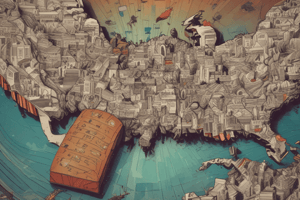Podcast
Questions and Answers
What is authoritarianism?
What is authoritarianism?
- A regime emphasizing individual freedom and civil rights
- Forms of nondemocratic rule where the regime denies citizens participation, competition, and liberty (correct)
- A political system promoting democracy
- A government system based on religious law
What is bureaucratic authoritarianism?
What is bureaucratic authoritarianism?
A regime where the state bureaucracy and military believe that technocratic leadership can solve the country's problems.
Define causation.
Define causation.
Where an event 'X' leads to a result 'Y'.
What is clientelism?
What is clientelism?
What is a constitution?
What is a constitution?
What does co-option involve?
What does co-option involve?
Explain corporatism.
Explain corporatism.
What is correlation?
What is correlation?
What does empirical mean?
What does empirical mean?
What is the role of government?
What is the role of government?
Define an illiberal/hybrid regime.
Define an illiberal/hybrid regime.
What does kleptocracy mean?
What does kleptocracy mean?
What is legitimacy in a political context?
What is legitimacy in a political context?
Define liberal democracy.
Define liberal democracy.
What is a nation?
What is a nation?
Describe a nondemocratic regime.
Describe a nondemocratic regime.
What does normative mean?
What does normative mean?
Flashcards are hidden until you start studying
Study Notes
Authoritarianism and Regimes
- Authoritarianism entails nondemocratic governance, restricting citizen participation, competition, and freedom.
- Bureaucratic authoritarianism relies on state bureaucracy and military for technocratic leadership, viewing public participation as a hindrance.
Key Political Concepts
- Causation denotes a relationship where event "X" causes result "Y".
- Clientelism involves co-opting individuals through benefits for political support, relying on personal patronage.
- Co-option is a widespread tactic in nondemocratic regimes, creating dependency on the state for rewards.
Governance Structures
- Constitutions outline the governing principles and laws of a society.
- Corporatism consolidates control in non-democratic regimes by managing limited state-approved organizations representing public interests.
- Nondemocratic regimes lack public accountability, where power is centralized among a small elite without significant citizen input.
Legitimacy and Democracy
- Legitimacy represents the general belief in a government's right to rule.
- Liberal democracy emphasizes participation, competition, and civil liberties, contrasting with illiberal/hybrid regimes that blend democratic and authoritarian traits.
- Democratization is the transition process towards democracy, initially achieving procedural then substantive democracy.
Notable Figures and Institutions
- Mahmoud Ahmadinejad, elected in 2005, increased conservatism and faced protests in the 2009 election marred by allegations of fraud.
- The Assembly of Experts, an 88-member body, theoretically oversees the Supreme Leader's performance but relies on candidates vetted by the Guardian Council.
- Ayatollah Khomeini, the first Supreme Leader, introduced the concept of rule by clergy, emphasizing clerical authority in governance.
Societal Dynamics and Ethnicities
- Civil society consists of autonomous organizations outside state control, like religious and cultural institutions.
- Baha'is are a persecuted religious minority in Iran; Kurds are an ethnic group facing oppression.
- The Revolutionary Guard evolved from a paramilitary force supporting the regime to a significant economic player.
Economic Considerations
- Resource trap theory suggests that natural resources can hinder modernization and democracy, allowing leaders to avoid tax responsibilities.
- Rentier state refers to reliance on external revenues from natural resources, impacting state structure and governance.
Legal and Religious Frameworks
- Sharia law is the legal system in Iran, derived from the Koran, governing various aspects of life.
- The Guardian Council, comprised of clerics and legal experts, reviews legislation to ensure conformity with Islamic principles.
- Velayat-e Faqih advocates for clerical rule, suggesting that senior clerics are best suited to govern in an Islamic society.
Historical Context
- The Iranian Revolution transformed Iran into a theocracy in 1979, emphasizing religious leadership.
- The White Revolution initiated in 1963 by the Shah aimed to modernize Iran through land reform and women's enfranchisement but faced protests.
Political Dynamics
- Populism conveys the belief that elites do not adequately represent the populace, often led by charismatic leaders.
- One-party rule indicates total control by a single political party, often accompanied by suppressing alternative parties.
- SANAVAK was the secret police under the Shah, maintaining control until the revolution in 1979.
External Relations
- The Iran nuclear deal aimed to prevent nuclear weapon development in exchange for lifting sanctions, negotiated by the U.S. and world powers.
- OPEC, of which Iran is a founding member, governs oil production policies among member countries.
Additional Observations
- The cultural revolution in the 1980s sought to eliminate Western influences in Iran.
- Charismatic legitimacy arises from a leader's appeal, impacting their authority and governance style.
Studying That Suits You
Use AI to generate personalized quizzes and flashcards to suit your learning preferences.




